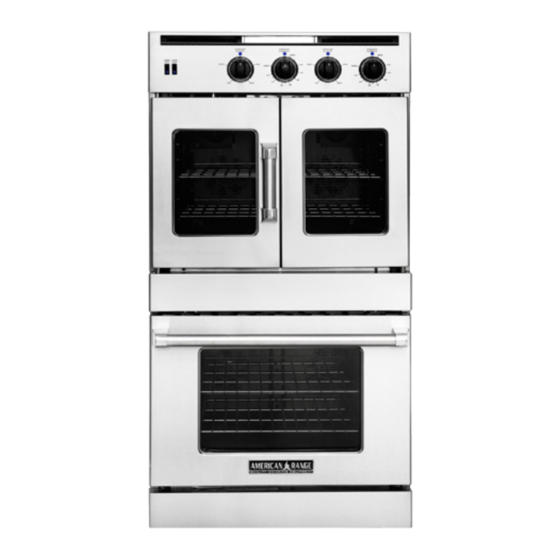American Range AROFFHGE-230 Use And Care Manual - Page 13
Browse online or download pdf Use And Care Manual for Oven American Range AROFFHGE-230. American Range AROFFHGE-230 20 pages.

Use & Care Manual
Legacy Wall Ovens
OVENS 101
The oven is a temperature controlled cooking cavity which is highly insulated to keep the kitchen cool and the food hot. The oven contains
two heat sources - Bake, positioned below the oven floor, and Broil, located in the ceiling of the oven. Bake and Broil are very different
cooking operations and the burners are designed to deliver energy in a way appropriate to the task.
There are two types of baking - called Standard Bake (or conventional) and Convection Bake. Standard baking make the best use of
Grandma's cookie, cake or pie recipes – such as Bake at 350ºF for forty-five minutes – to get the job done. These recipes are tried and
true – conventional or standard bake will deliver wonderful performance for roasting.
In convection cooking, not only is the cook time faster, but also, the oven temperature is more even, top to bottom and side to side - so
cookies on several racks will have the same brown color and texture. Food does not need to be rotated to get uniform color. However, to
best take advantage of convection, use low, shallow bake ware so that moving air can get over the sides and up to the food surface. Foods
in covered dishes (like casseroles or pot roasts) do not benefit from convection cooking.
OVEN OPERATION
To start the oven, push in and turn the thermostat to the desired operating temperature from 200ºF to 500ºF. On a gas oven, you may
be able to see a bright glow from the sides of the oven bottom - this is normal and indicates the hot surface igniter is activated. Once the
igniter is hot enough for ignition, the gas valve will open, allowing the flow of gas into the bake burner. This may take up to one minute. On
an electric oven, you will see the ribbon element below the glass on the oven floor glow.
During the first few minutes of operation, a mild condensation may appear on the interior glass pane of the door window. Water vapor
is a normal by-product of combustion, and the condensation will disappear as the oven warms.
Allow the oven to preheat before use. The control panel light will turn off when preheat is complete. After preheat, the light will cycle on
and off whenever the oven is heating.
Never place any pan or food item on the bottom of the oven, always use an oven rack.
To use the Broil feature of the range, first consider what type of broiling you would like to perform. The closer you are to the broil burner,
the faster you will evaporate moisture from the surface of food and the quicker the surface will brown. In a similar fashion, the further
away you place the food (on the lowest rack, for example) the slower you will evaporate surface moisture and the longer it will take for
the surface to brown. A good rule of thumb is to start about 6" away from the broiler and watch for how quickly the food is browning.
BROILER OPERATION
To begin broiling, push in and turn the thermostat to the position labeled BROIL on the control knob. In about twenty seconds, you will
see a bright glow in the oven - this is the hot surface igniter. Once the igniter is hot enough for ignition, the gas valve will open, allowing the
flow of gas into the broil burner. This may take up to one minute.
The broiler will have a blue flame that covers the ceramic tiles – after a few minutes, the tiles will glow bright red/orange and radiate infrared
energy. Remember the red surface is over 1800ºF in temperature and can be a source of serious burns or injury.
On an electric oven, you can see the ribbon element glow on the roof of the oven cell. This takes just a few seconds.
The Bake burner and Broil burner will not operate at the same time; the convection fan will not operate during Broiling.
9
13592 Desmond St., Pacoima, CA 91331 818.897.0808 tel 888.753.9898 toll free www.americanrange.com
